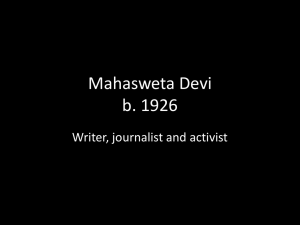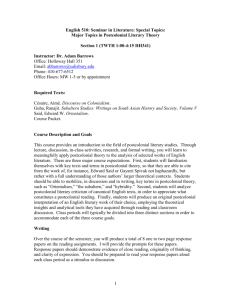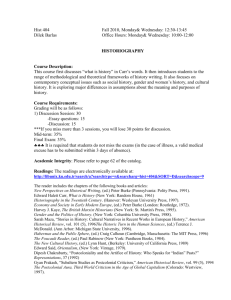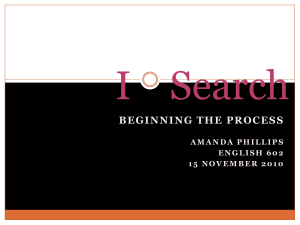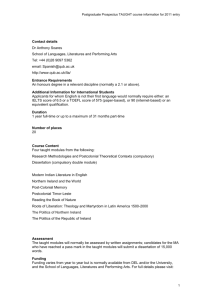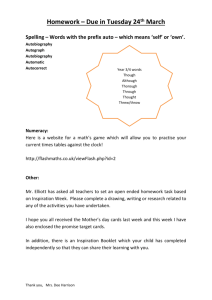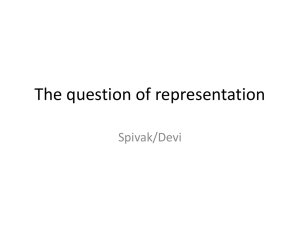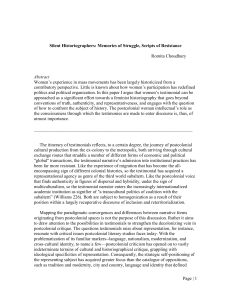Module Leader: Professor Ann Heilmann
advertisement
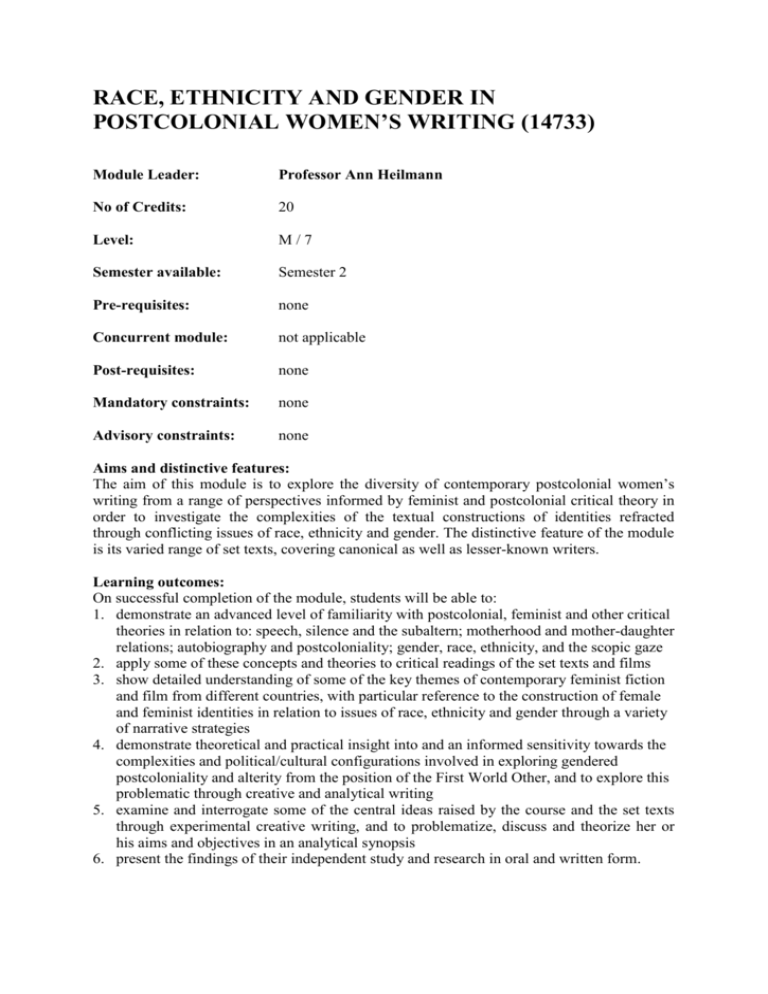
RACE, ETHNICITY AND GENDER IN POSTCOLONIAL WOMEN’S WRITING (14733) Module Leader: Professor Ann Heilmann No of Credits: 20 Level: M/7 Semester available: Semester 2 Pre-requisites: none Concurrent module: not applicable Post-requisites: none Mandatory constraints: none Advisory constraints: none Aims and distinctive features: The aim of this module is to explore the diversity of contemporary postcolonial women’s writing from a range of perspectives informed by feminist and postcolonial critical theory in order to investigate the complexities of the textual constructions of identities refracted through conflicting issues of race, ethnicity and gender. The distinctive feature of the module is its varied range of set texts, covering canonical as well as lesser-known writers. Learning outcomes: On successful completion of the module, students will be able to: 1. demonstrate an advanced level of familiarity with postcolonial, feminist and other critical theories in relation to: speech, silence and the subaltern; motherhood and mother-daughter relations; autobiography and postcoloniality; gender, race, ethnicity, and the scopic gaze 2. apply some of these concepts and theories to critical readings of the set texts and films 3. show detailed understanding of some of the key themes of contemporary feminist fiction and film from different countries, with particular reference to the construction of female and feminist identities in relation to issues of race, ethnicity and gender through a variety of narrative strategies 4. demonstrate theoretical and practical insight into and an informed sensitivity towards the complexities and political/cultural configurations involved in exploring gendered postcoloniality and alterity from the position of the First World Other, and to explore this problematic through creative and analytical writing 5. examine and interrogate some of the central ideas raised by the course and the set texts through experimental creative writing, and to problematize, discuss and theorize her or his aims and objectives in an analytical synopsis 6. present the findings of their independent study and research in oral and written form. Learning and teaching strategy: The module will be taught in ten weekly two-hour seminar sessions. Emphasis will be placed on student presentations. Three film viewings will be compulsory; further film and documentary viewings will be optional. Students will be required to read, prepare and apply critical theory extracts throughout. Arrangements for revision and private study: Students will be encouraged to make use of office hours for essay consultation. The Easter vacation will provide a natural break for reading, revision, and essay preparation. Assessment strategy: One presentation with handout and bibliography, 30% (presentation=20%, handout=10%); one 4,000 word creative essay, 70%. Creative essays must contain a substantial analytical/self-reflexive component in which students discuss their aims, the relevance of their creative piece to the module and selected texts (providing evidence of an advanced critical understanding of these texts) and their choice of narrative strategies/ Method of re-assessment: As above (presentation to be given to module convenor). Indicative content: This seminar module draws on postcolonial and feminist theory to explore the representation of female identities in and from a variety of cultural backgrounds (African-American, British-Asian, Chinese-American, Indian and Pakistani, Morocco, New Zealand, Nigeria, US). We shall examine the contemporary re/presentation of the ethnic, raced and gendered self in a number of genres: the novel, the short story, (television) drama, autobiography, and film. What textual strategies do contemporary women writers use to problematize the (de)construction of female selves? What aesthetic, cultural, and political issues are reflected in and raised by their writings? How important are mother-daughter and woman-to-woman relationships to the processes shaping female identity? How does the subaltern overcome her condition of silencing in culture and society? How do women from diverse cultures reflect on, resist, or embrace socially and culturally constructed models of gender, race and ethnicity in (re)claiming (individual/communal) identities? These are some of the issues to be explored in this course. The module is accompanied by film viewings, three of which are mandatory. Week 1 Introduction to postcolonial women’s writing; Gurinder Chadha, Bhaji on the Beach and Bend It Like Beckham 2 Gender and generation, race and ethnicity: Bhaji on the Beach and Bend It Like Beckham 3 Critical theory discussion: approaches to postcolonial literature and women’s writing (Gayatri Spivak, ‘Can the Subaltern Speak’); language, power, and silence in Ketaki Kushari Dyson’s Night’s Sunlight 4 The clash of cultures: Chitra Banerjee Divakaruni, Arranged Marriage 5 Close company (1): Motherhood and mother-daughter relations: Adrienne Rich (Of Woman Born) and Emily Prager, ‘Visit from the Footbinder’; Luce Irigaray (‘And the One Doesn’t Stir Without the Other’) and Jamaica Kincaid, ‘My Mother’; plus other selected texts (selections will vary from year to year depending on student choice) 6 Close company (2): Amy Tan, The Joy Luck Club 7 Autobiography and fiction (1): Autobiography theory; Fatima Mernissi, The Harem Within 8 Autobiography and fiction (2): Janet Frame, An Angel at My Table and/or Maya Angelou, I Know Why the Caged Bird Sings 9 The voyage in: Toni Morrison, The Bluest Eye 10 The voyage out: Jane Campion, The Piano Indicative bibliography: Angelou, Maya (1984) I Know Why the Caged Bird Sings. London: Virago. Divakaruni, Chitra Banerjee (1997) Arranged Marriage. London: Black Swan. Irigaray, Luce (1981) ‘And the One Doesn’t Stir without the Other’, Signs, vol. 7: 1, pp. 60-67. Dyson, Ketaki Kushari (2000) Night’s Sunlight. Kidlington: Virgilio Libro. Frame, Janet (1998) An Angel at My Table, in The Complete Autobiography. London: Women’s Press. Kincaid, Jamaica (1987) ‘My Mother’, in Christine Park and Caroline Heaton, eds Close Company: Stories of Mothers and Daughters. London: Virago, pp. 93-98. Morrison, Toni (1979) The Bluest Eye. London: Picador. Mernissi, Fatima (1994) The Harem Within: Tales of a Moroccan Girlhood. London: Bantam Books. Prager, Emily (1987) ‘A Visit from the Footbinder’, in Christine Park and Caroline Heaton, eds Close Company: Stories of Mothers and Daughters. London: Virago, pp. 48-76. Rich, Adrienne ((1992) Of Woman Born: Motherhood as Experience and Institution. London: Virago. Spivak, Gayatri (1988) ‘Can the Subaltern Speak?’, in Patrick Williams and Laura Chrisman, eds (1994) Colonial Discourse and Post-colonial Theory: A Reader. New York: Harvester Wheatsheaf, pp. 66-111. Tan, Amy (1990) The Joy Luck Club. London: Minerva. Recommended critical background reading: Loomba, Ania (1998) Colonialism/Postcolonialism. London: Routledge. Films: Bhaji on the Beach (Gurinder Chadha, 1993) Bend It Like Beckham (Gurinder Chadha, 2001) The Piano (Jane Campion, 1993)
